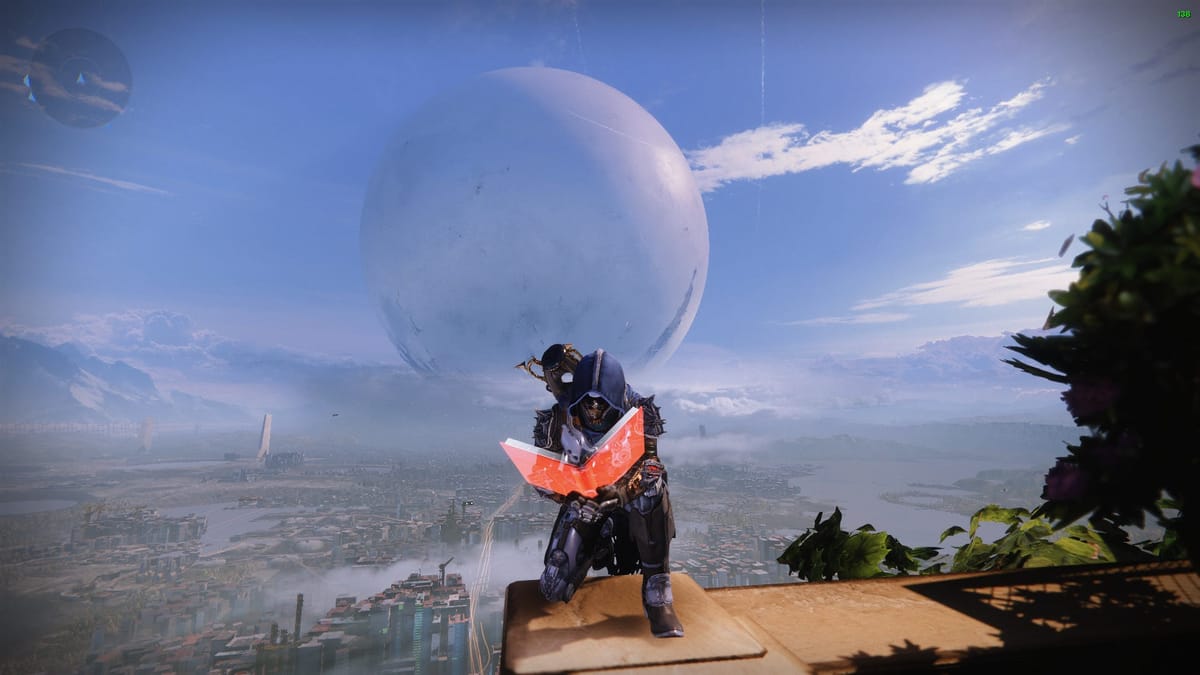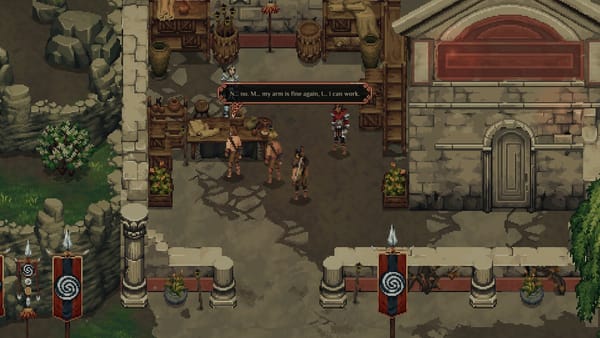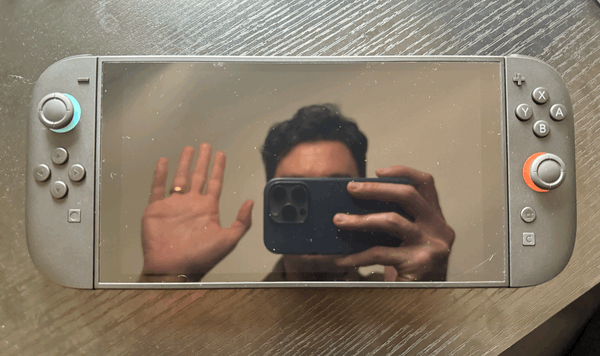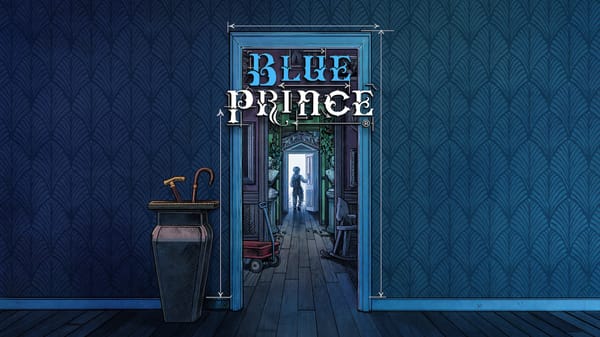Destiny 2 and the infinite scroll
When lore is never-ending, where do we start?

Destiny 2 has a grand story, but you might miss most of it. Consider the gameplay loop: you fight through hordes of monsters, jump across platforms through vast corridors, kill a boss, and eventually arrive at a treasure chest that will open before you. You’re awarded with a fancy weapon or piece of armor, though maybe not the one you wanted. So you go back through the sequence again. And again. And another time, now that new content just dropped with Season of Plunder, with the promise of even more desirable loot. It is the grind, and it is addictive: a tried-and-true gameplay loop, boosted to glorious heights by Bungie’s legendarily polished art direction and sound design. Playing Destiny 2, you realize this loop may be all any videogame needs to be successful. You might not even need a story. The loop is its own reward.
But Destiny 2 does have a story. Moreover, it’s a good one, albeit delivered in a method alien to other art forms.
Many Destiny players, especially newer ones, will likely admit that they have no idea what is going on in the game’s story or the world. And yet, for some, the game’s story and worldbuilding are major reasons for their commitment to the Destiny franchise. For myself, I have been just as devout a follower of Destiny’s story as I am a follower of every new raid mechanic.
Destiny’s loot drops perform a dual function: for almost every piece of equipment you acquire, the game gives you a little chunk of story to go with your shiny new toy. Naturally, whenever you get a new weapon or piece of armor, you open the menu to review its stats to see if you want to use it. On the same screen, tucked away at the bottom, is a button prompt for reviewing that item’s lore. If you choose to do so, the screen immediately fills with long blocks of text. These entries immediately feel like fragments from some longer tale. Some are short stories, some are poems. Some are messages or letters. They can be deeply moving or irreverent. Some even break the fourth wall. In these fictions, you may recognize the names and phrases from the encounters you have just blasted your way through, hungry for loot. A monster you killed without a second thought might have a fleshed-out story about the life they lived before dying by your hands. Through these text, you will become privy to the innermost thoughts of characters you’ve barely interacted with, and some you’ll never meet. If you are curious enough, you might even begin to piece all these fragments together, constructing a larger and more beautiful story in your mind as, loot drop after loot drop, you read the equivalent of a novel’s worth of words. Some mysteries will be solved, and some mysteries will deepen. But it never quite ends. It is as if these pieces of stories are a kind of loot as well. You are not playing just to get a better weapon. You are also playing to find out what is going on and why you are doing the things that you are doing. Sure, there are cutscenes that give you the broad strokes. But the lion’s share of the narrative is holed away in optional menus some players might never traverse.1
This is the irony of Destiny 2’s storytelling: you have to stop playing to experience much of it. The medium’s central conceit—interactive gameplay—does not convey Destiny’s full narrative scope. The story and the gameplay exist as separate forms under the umbrella of the game’s universe. Yes, you play to “acquire” the story, but to engage with it, the gameplay loop must stop. You need to cease gunning and running and take a moment to read.
This particular narrative structure—item descriptions that forward a larger, richer story—may sound familiar to fans of FromSoftware’s Dark Souls series and, more recently, Elden Ring. The difference, as I see it, is that Dark Souls players get to finish their game. They can get to the story after the gameplay is over, because it does end. Destiny, by contrast, is ongoing. Its tale is endless. Because of this, in order to get the most of Destiny’s story, you have to get off the train while it’s still on the tracks.
For many, if not most, Destiny’s gameplay is what they are there for: the running, the gunning, the puzzle solving, the teamwork, and, of course, the looting. It is a constant supply of dopamine, updated regularly with ever better reasons to feel good. For those players, the story can feel like an afterthought. As well-written as the lore is, and as obviously laborious as it is to put together, I don’t blame people who skim it entirely. However, if you do engage with it, actively choosing to take time away from the gameplay, then the gameplay experience becomes richer as the textual fragments provide meaning for your ceaseless activity. The gameplay loop—fight, loot; fight, loot; rinse-wash-repeat—becomes more than just the pursuit of ever greater strength. In fact, engaging in the game this way, you might find yourself encountering a new form of storytelling entirely.
Unlike forms that tell singular stories, Destiny’s divide between one’s actions and how one comes to learn the causes and consequences of those actions is a spectacle-filled mirror of our own experience. Meaning, in our fragmented age, is something we must actively seek out. It is not delivered to us so easily. So, too, in Destiny: if we dedicate a portion of our pleasure-seeking time not just to blowing up monsters from outer space, but also to tracking down and understanding the history of this world and our place in it, there are bountiful threads to be discovered. What’s more, even if we decide not to do such solitary work, spending time, even casually, in the game’s social community leads us to be aware of the whispers and rumors of things beyond our present understanding. No matter how you encounter it, the game’s lore creates this sense of a world that is far bigger than the limited spaces you can traverse by yourself. For every player, there are thousands upon thousands more, each of them with their own singular experience, yearning for expression. So, too, with life. Every day we are inundated with stories and news flashes. They ping onto our devices like loot drops. Do we read all of them? Can we, even? But the fact is that they exist, and they happened. We may not even read them beyond the headlines, but, in simply seeing them and acknowledging that they exist, we get the sense that this world does not revolve around us alone. The constellation of these stories is always present. We are each of us but one star, however bright.
In this light, the presentation of lore in the Destiny franchise is a mirror of our own experiences with the fragments of the everyday. Tweets, headlines, memes, texts—we read them to know more about the world, and we can try to make some sense of them, but the fact of them merely being there tells us we are only a single thread in a grander tapestry. Destiny 2 understand this. That such storytelling and meaning-making is being done in a videogame in which you play as a god-slaying, world-saving hero perhaps points to greater possibilities, in art and in life. It is possible that a videogame narrative structure like that of Destiny 2 might one day be instrumental in expressing, or even simulating, how each of us can feel this simultaneous sense of purpose and alienation from the world we inhabit. When we first play Destiny 2, we open our eyes in a barren wasteland, surrounded by skulls and hunted by monsters. We become stronger to survive, but the cruel indifference of the world does not change, even if we do. And yet, if we take a moment to learn about this world, we find out that both the skulls and the monsters have stories of their own. Destiny 2 invites us, then, to imagine other possibilities. To see the stars as evidence of adventure, yes, but also as cause for humility in the face of infinite stories told infinitely.
For those looking for primers or deep-dives on Destiny’s story, there are countless content creators on YouTube, like My Name Is Byf, who have done incredible work researching and piecing together the game’s endless lore, presenting it in far more entertaining ways than I am capable of here. There are also community wikis, with thousands of pages dedicated to the lore, and a 171,000-member subreddit, r/DestinyLore, that exists solely for the purpose of discussing the story elements. This community-oriented nature of how Destiny’s story gets consumed is its own fascinating topic—for another time. ↩



